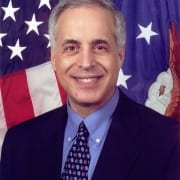Now Hear This, O Israel
By Captain Arnold E. Resnicoff, Chaplain Corps,
U.S. Navy (Retired)
On a Navy ship, before an important announcement over the public address system, the boatswain’s mate sounds the bosun’s call with a pipe/whistle, followed by the words, “Now Hear This.”
This sound to get our attention always reminded me of the shofar blast, and the words reminded me of the beginning of the Shema: “Hear, O Israel.”
In both these phrases, the word “hear” means much more than the physical act of hearing. The word is a command, closer to the old English word hearken. It means listen, understand, and obey. It is similar in some ways to another military phrase, “attention to orders.”
On the radio the word roger, which stood for the letter R in an older version of the phonetic alphabet, indicates message received. However, received means both heard and understood. Wilco (from “will comply”) adds the third layer, meaning the message was heard, understood, and will be obeyed. Although film actors often say “roger, wilco,” that would be redundant… although not as bad as the actors who say “over and out,” rather than choosing one or the other!
The idea that a military command includes all three of these ideas – hear, understand, and obey – is longstanding tradition, and the Navy reply, “aye, aye,” specifically affirms all three components: I hear, I understand, and I will obey. In other words, I have received the order, understand it, and will carry it out.
In the Bible, the Israelites at Mount Sinai, after receiving God’s commandments through Moses, respond “naaseh v’nishmah,” meaning “we will do and we will hear/understand.” That reply is the Biblical equivalent of “aye, aye” or “wilco.” However, commentators note that because the word do precedes the word understand, the theological and philosophical lesson is that we often hear more deeply and understand more fully only after we take action to incorporate the commandments into our lives.
On a ship, after “now here this,” we pay attention, preparing ourselves to understand the orders that come next, and then take action to follow those orders. In prayer, whether in synagogue or not, we should do the same when we hear the Shema. We should struggle to hear the words, to understand their meaning, and then to obey them through the way we live our lives.
When we hear “The Lord is our God,” that means that the false gods of ancient times, or the false gods of modern times like money or power, are not our God. But it also means we are not God. Truly hearing that one idea should change our lives.
When we hear “God is one,” we should understand that one God means we live in a world created with one plan. Ancient people who believed in many gods could not learn from history because they could not be sure the gods they dealt with on one day were the same ones as on another.
In a way, Jews introduced the idea of history with the idea of monotheism. We believe we can learn lessons of the past. We hear by searching for history’s lessons and then making those lessons a part of our lives.
“God is one” also teaches that God is uniquely whole, unlike human beings who are flawed and fragmented. Our nation’s founders dreamed that we should pursue “a more perfect union” when it came to our nation. We must do the same as individuals, pursuing integrity, the integration of our dreams, our words, and our actions, and trying to do a more perfect job of walking the talk.
In 1987, I was honored to give the prayer for the first United States Days of Remembrance of the Victims of the Holocaust ceremony ever held in the Capitol Rotunda. These ideas drove the words of my prayer:
“ …if the time has not yet dawned when we can all proclaim our faith in God, then let us say at least that we admit we are not gods ourselves. If we cannot yet see the face of God in others, then let us see, at least, a face as human as our own.”
If we truly hear the words of the Shema, if we hearken to those words, struggling to understand their meaning with all our heart, our soul, and our might, with every fiber of our being, not only will our lives be changed, but so will our world.
Rabbi Resnicoff, a lifetime JWV member, began his Naval career as a line officer and then served in chaplain assignments including Command Chaplain, U.S. European Command, the “top chaplain” for military personnel of all services and all faiths in an area that at the time included 93 nations spanning 13 million square miles. Following retirement, he served as National Director for the American Jewish Committee and Special Advisor for Values and Vision to the Secretary and Chief of Staff of the U.S. Air Force. On October 23, 1983, he was present in Beirut during the Beirut Barracks bombing. His eye-witness report was read by President Ronald Reagan as a keynote speech in Washington, DC.
Volume 74. Number 1. 2020




